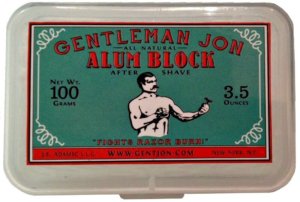By Customshaving.com
Customshaving.com was a New York City based purveyor of quality shaving supplies. We provide a carefully selected line of shaving tools, soaps, creams and brushes to help their customers achieve a pleasurable shave each morning.
The Custom Shaving team received a call one fall afternoon from a gentleman named Jon looking to meet up over a drink regarding a potential new product to add to their shaving selection. Since the CS team is always searching for new shaving products to add to their collection, they agreed to hold the meeting at New York City’s well-known Campbell Apartment in Grand Central.
Custom Shaving and Gentleman Jon Alum Block
Indulging over hoppy IPA’s amidst the bustling rush hour background, Jon and the CS team exchanged shaving tips and discussed the latest shaving trends. As the conversation transcended, Jon went on to explain his vision: creating the best possible value alum block. He then explained the inspiration behind the idea. What had struck us beyond the block was his commitment to honor his father, a lifelong blue- collar carpenter, who had just passed.
In an effort to keep his father’s legacy alive, Jon used copper and other construction metals his father had stored to cash for scrap as the funds to start his company. Drawing on this, Jon highlighted the hardworking, traditional American through hidden meanings and through colors on the block’s design and branding. Jon used an elegant but rugged 1920’s design for the block. He also signified his father’s life long work through color: the changing nature of copper from orange to green tones overtime symbolized both his father’s work and the block’s own durability and longevity. Alum blocks can last three or more years, even with frequent use. Lastly, the wet shaver holds the safety razor in a boxing position, resembling the common bond that wet shaving provides between father and son, along with how the alum block “Fights Razor Burn.”
The whole idea of creating the alum block is just as interesting as the design of the block. Jon was frustrated with the overpricing of large, brand name alum blocks, but also noticed that more affordable options did not contain enough material to justify the price. Jon wanted a better option to replace the finishing touch to his daily shaving routine. Alum blocks were routine in helping Jon close his pores, fight razor burn and prevent irritation. Jon knew that all alum blocks perform the same basic actions and thought there had to be a way for someone to fill the void by offering a block that was reasonably sized, competitively priced, and offered wet shavers the most alum for dollars spent.
Since its inception earlier this year, the Gentleman Jon Alum Block has been a success because of its value, concept, and original design; it’s packaged in a well built, study plastic case that makes for clean, easy storage and travel. At $6 and 3.5 oz (100 g) of alum, it comes at a value that you’ll be hard pressed to beat.
Potassium alum is created and found in naturally occurring sulfate mineral encrusted on rocks in areas of weathering and oxidation. Due to its unique qualities, the alum block has been used for centuries as a natural deodorant and antiperspirant, not only to heal minor nicks and cuts but also to tone the skin, close pores, and most of all “Fights Razor Burn.” To use, wash your face daily with cold water and wet the alum block, rub alum onto skin and let sit for 20 – 30 seconds before rinsing off with cold water. When applying to a nick or cut, apply alum block with slight pressure and rest on the cut for 5 – 10 seconds, then remove and wash.


I find it hard to believe he would claim it is 100% Potassium Alum if it wasn’t. That’s an awful big risk. Have any of you used it ? because it gets great reviews on Amazon.
on the underside of the packaging, it notes: “Made in China.”
I’m a big fan of Razorock’s stick. You just can’t leave it wet or else it dislodges from the plastic handle. Thanks for the article, going to check these guys out. I really like the connection to his father.
A good question! Some time ago I bought a block of alum from an Italian based and named company. The alum felt and reacted quite differently to what I had been used to. Further investigation showed “Made in China” in lettering so small as to be unnoticeable and almost impossible to read. Potassium Alum or Ammonium Alum????
It looked different, felt different and I assume was different. Possibly compressed bits and pieces. The French “stuff” is the bees knees.
Trumpers alum is also great, but expensive. Possible sourced from the
French company???
Question… Where is this block made?
It looks like chinese block. We tested over half dozen Chinese blocks and none of them were natural potassium alum.
Isn’t it illegal to sell a product in the USA without listing a country or origin?
Comments are closed.